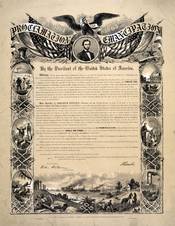Slavery was popular in America in the 18th and 19th centuries. The Southern states, with agricultural economies, relied on the slavery system to ensure the cash crops, such as; cotton, hemp, rice, and tobacco. Slaves were not unknown in the North, but abolition in the North was completed by the 1830's. In 1808, the Congress prohibited the slave trade, not a year later than allowed in the Constitution. A series of compromises, laws, acts, and bills tried to keep the balance between the slave states and the non-slave states.
South Carolina voted to secede from the United States as a result of Abraham Lincoln's election to the Presidency. Lincoln had, over time, voiced strong objections to slavery, and his incoming administration was viewed as a threat to the right of the states to keep their institutions, particularly that of slavery, the business of the states. More states seceded, eleven in all, forming the Confederate States of America.
The secession movement led to the Civil War.
The ratification of the 13th Amendment was a major victory for the North, and it was hoped that with the Emancipation Proclamation and the 13th Amendment, the effects of slavery in the United States would quickly begin to fade away. The original plan to readmit states after acceptance of the 13th was supported by President Andrew Johnson, but the Radical Republicans, as they became known, wanted more than just a return to normalcy. They wanted to keep the power they had attained during the war years. The South did not make it easy for Johnson, however, and the so-called Black Codes started to be passed in Southern states. Congressional inquiries into the Black Codes found them to be a new way of controlling freedmen, fraught with violence and cruelty.
The ensuing Reconstruction Acts placed the...
